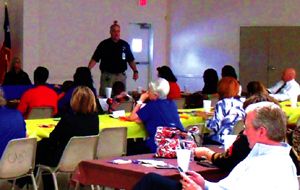

HIGHLANDS Earl Smith of the Harris County Citizen Corps of the Homeland Security & Emergency Management gave a presentation at the Highlands Community Center for the Highlands-Lynchburg Chamber of Commerce on Nov. 10 concerning preparedness for emergencies.
The topic was disaster preparedness: get a kit, make a plan, stay informed and be involved. Your ability to survive a disaster depends on you doing your part to prepare for the unexpected.
Making a kit involves having at least seven days supply of water one gallon per person per day. The home will need at least seven days of food supply of nonperishable canned food for everyone in the household. A first aid kit is recommended. The kit will need a flashlight with extra batteries, a battery powered radio, all the medications and special items needed for regular subsistence, tools, toilet paper, personal hygiene items, changes of clothes and bedding, cash and important family documents, copies of your critical information and provisions for pets.
Then there is a need for updating and refreshing these items.
The first disaster tackled by the Mr. Smith with assistance from Julie Oates of County Judge Ed Emmetts office was hurricanes and floods.
What is the greatest danger from hurricanes? The tidal surge answered the listeners. Floods are Harris Countys most common natural hazard.
Listeners were advised to keep up with news reports, fill bathtubs with and all available containers with water, turn off utilities if requested, remain indoors away from windows, and cover family members with a blanket or furniture to protect from flying objects.
If ordered to evacuate, know the local hurricane evacuation route(s) to take and have a plan for where you can stay.
If you are not in an area that is advised to evacuate and you decide to stay in your home, plan for adequate supplies in case you lose power and water for several days and you are not able to leave due to flooding or blocked roads. Make a family emergency communication plan. Many communities have text or email alerting systems for emergency notifications.
Hurricane winds can cause trees and branches to fall, so before hurricane season trim or remove damaged trees and limbs to keep you and your property safe.
Secure loose rain gutters and downspouts and clear any clogged areas or debris to prevent water damage to your property.
Reduce property damage by retrofitting to secure and reinforce the roof, windows and doors, including the garage doors.
Remember to keep generators and other alternate power/heat sources outside, at least 20 feet away from windows and doors and protected from moisture; and NEVER try to power the house wiring by plugging a generator into a wall outlet.
Consider building a FEMA safe room or ICC 500 storm shelter designed for protection from high-winds and in locations above flooding levels.
Harris County residents are also subject to hazardous material incidents. During such an incident local officials may ask residents to shelter in place instead of evacuating. When called for staying indoor until the emergency is over is advised rather than going outside and exposing ones self to exposure. Residents are then advised to turn off air condition and prevent chemical vapors from entering. Choose a room to stay in with few openings like windows or doors.
Finally, the get involved aspect is to join the Harris County Citizens Corps Harris. A new website was launched in September for County Citizen Corps website: www.harriscounty citizencorps.com. It provides emergency preparedness resources and the latest news and information.
The website was revamped to make it more useful and easier to see on mobile devices, said Harris County Judge Ed Emmett. It also gives us the opportunity to promote our mission to make our communities safer, stronger and better prepared.
Since its inception in August of 2002, Citizen Corps has been coordinating the training and education of thousands of volunteers in an effort to build a strong partnership between residents, local leaders and emergency responders.
Harris County Citizen Corps membership includes 28,864 trained volunteers involved in 254 Community Emergency Response Teams; 21,892 volunteers from 24 Volunteers in Police Service agencies; 4,165 volunteers from the Medical Reserve Corps; 6,137 volunteers from the 351 neighborhoods participating in the USA on Watch program; and 24 Fire Corps programs.

